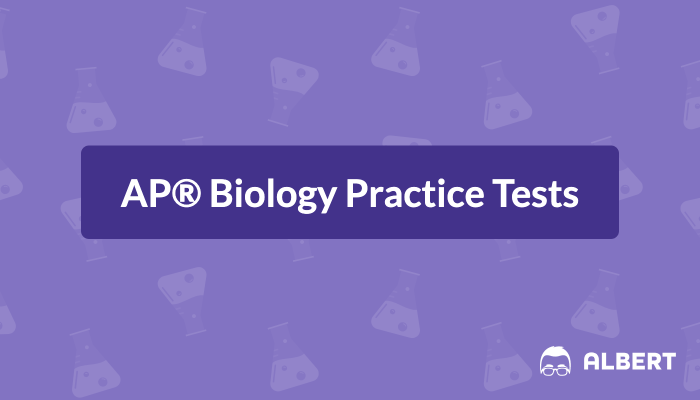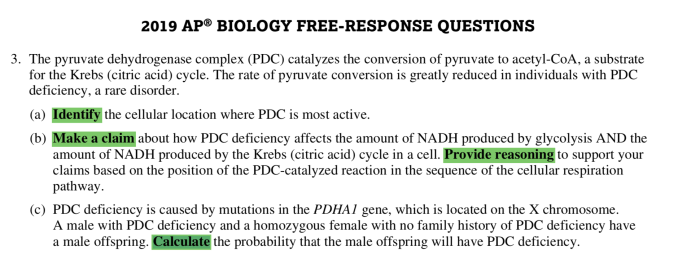The AP Biology Ecology Test is a daunting challenge, but with the right preparation, you can conquer it. Our exclusive ap biology ecology test pdf provides everything you need to excel, from in-depth content reviews to expert test-taking strategies.
Our guide covers the entire scope of the test, including population ecology, community ecology, and ecosystem ecology. With clear explanations, engaging examples, and practice questions, we’ll help you master the key concepts and develop the critical thinking skills necessary for success.
AP Biology Ecology Test Overview
The AP Biology Ecology Test evaluates students’ understanding of the principles and concepts related to the study of ecology, focusing on three major areas: population ecology, community ecology, and ecosystem ecology. The test aims to assess students’ ability to analyze ecological data, interpret ecological patterns, and apply ecological principles to real-world scenarios.
The test format typically includes multiple-choice questions, free-response questions, and data analysis tasks. Students are expected to demonstrate their knowledge of ecological concepts, including population growth models, species interactions, biodiversity, energy flow, and nutrient cycling.
Population Ecology
This section covers the study of populations, including population growth patterns, population dynamics, and factors affecting population size and distribution. Students should understand concepts such as carrying capacity, exponential and logistic growth models, and the impact of environmental factors on population growth.
Community Ecology
This section focuses on the interactions between different species within a community, including competition, predation, symbiosis, and species diversity. Students should be familiar with concepts such as ecological niches, keystone species, and the role of biodiversity in maintaining ecosystem stability.
Ecosystem Ecology
This section examines the interactions between organisms and their physical environment, including energy flow, nutrient cycling, and the impact of human activities on ecosystems. Students should understand concepts such as food webs, trophic levels, biogeochemical cycles, and the role of ecosystems in maintaining the planet’s equilibrium.
Study Resources

Preparing for the AP Biology Ecology test requires dedication and effective study habits. To excel in this exam, utilize a combination of textbooks, online resources, and study guides. These materials provide comprehensive coverage of the test’s content and offer valuable practice opportunities.
Textbooks, Ap biology ecology test pdf
- Campbell Biology (12th Edition) by Jane B. Reece, Lisa A. Urry, Michael L. Cain, Steven A. Wasserman, Peter V.
Minorsky, and Robert B. Jackson
- Biology (11th Edition) by Kenneth A. Mason, Jonathan B. Losos, and Susan R. Singer
- AP Biology (8th Edition) by Campbell and Reece
Online Resources
- College Board AP Biology Course and Exam Description: Provides official information about the test’s format and content.
- Khan Academy AP Biology: Offers free video lessons, practice questions, and full-length practice tests.
- Bozeman Science AP Biology: Features engaging video lessons covering all test topics.
Study Guides
- Princeton Review AP Biology Premium Prep, 2023: Provides comprehensive content review, practice tests, and detailed explanations.
- Barron’s AP Biology: Includes thorough content review, practice questions, and diagnostic tests.
- SparkNotes AP Biology: Offers concise summaries, study tips, and practice questions.
Effective Studying Tips
To optimize your study efforts, follow these effective tips:
- Create a Study Schedule:Allocate specific time slots for studying and stick to them.
- Break Down Concepts:Divide complex topics into smaller, manageable chunks for easier comprehension.
- Use Practice Tests:Take practice tests to identify areas needing improvement and track your progress.
- Review Regularly:Regularly review the material you have covered to reinforce your understanding.
- Form Study Groups:Collaborate with classmates to discuss concepts, quiz each other, and provide support.
Test-Taking Strategies

To succeed on the AP Biology Ecology Test, effective time management and strategic question-answering techniques are crucial. This section provides valuable strategies to help you optimize your performance during the exam.
Time Management
- Allocate time wisely: Divide the available time evenly between the multiple-choice and free-response sections.
- Prioritize questions: Begin with questions you feel most confident about, leaving challenging ones for later.
- Pace yourself: Move through the test at a steady pace, avoiding spending excessive time on any single question.
Multiple-Choice Questions
- Read the question carefully: Identify the main concept being tested and the specific information required.
- Eliminate incorrect options: Rule out choices that are clearly wrong or do not match the question’s context.
- Make educated guesses: If you are unsure about the correct answer, select the option that appears most reasonable based on your knowledge.
Free-Response Questions
- Plan your response: Before writing, take a few moments to organize your thoughts and Artikel your main points.
- Support your claims: Use specific evidence from the provided passage or your own knowledge to support your arguments.
- Be concise and clear: Write in a clear and organized manner, using precise language and avoiding unnecessary details.
Challenging Questions
- Don’t panic: If you encounter a challenging question, remain calm and focus on understanding the underlying concept.
- Break down the question: Divide the question into smaller, more manageable parts to make it easier to approach.
- Seek clarification: If necessary, request clarification from the test administrator to ensure you understand the question correctly.
Sample Questions and Answers
To provide a comprehensive understanding of the AP Biology Ecology Test, it is essential to analyze sample questions and their corresponding answers. These resources offer valuable insights into the test’s format, content, and difficulty level.
The College Board provides a sample PDF of the AP Biology Ecology Test with answer keys on its official website. By reviewing these materials, students can familiarize themselves with the question types, identify common themes, and develop strategies for answering effectively.
Common Themes and Question Types
The AP Biology Ecology Test covers a wide range of topics within the field of ecology. Common themes that emerge in the questions include:
- Ecosystem structure and function
- Population ecology
- Community ecology
- Evolutionary ecology
- Environmental issues
Question types vary depending on the topic and can include:
- Multiple choice
- Short answer
- Long answer
- Data analysis
- Essay
Reasoning Behind Correct Answers
Understanding the reasoning behind the correct answers to sample questions is crucial for improving comprehension and test performance. By examining the questions and answer keys, students can identify the key concepts and principles that are being tested.
Correct answers are often supported by evidence from the passage or diagram provided with the question. They demonstrate a clear understanding of the underlying ecological principles and the ability to apply them to specific scenarios.
Practice Test Analysis
Practice tests are an invaluable resource for preparing for the AP Biology Ecology Test. They provide an opportunity to familiarize yourself with the test format, content, and question types. There are several different practice tests available, each with its own strengths and weaknesses.
AP Biology ecology test pdfs are helpful for studying the intricacies of the natural world. To delve deeper into the concepts covered in these tests, consider checking out the unit 2 progress check: frq . By exploring this resource, you can enhance your understanding of ecological principles and prepare for upcoming assessments on AP Biology ecology topics.
Practice Test Comparison
| Practice Test | Strengths | Weaknesses ||—|—|—|| College Board Official Practice Test | Accurate representation of the real test | Limited number of questions || Princeton Review Practice Tests | Comprehensive coverage of content | Some questions may be more difficult than the real test || Kaplan Practice Tests | Good for timed practice | May not cover all content areas equally || Barron’s Practice Tests | Detailed explanations for answers | Questions may be outdated or not representative of the current test |
Tips for Using Practice Tests
*
- *Take practice tests under timed conditions. This will help you get used to the pace of the real test and manage your time effectively.
- *Review your answers carefully. Identify areas where you need improvement and focus on those topics in your studies.
- *Use practice tests to track your progress. Compare your scores on different practice tests to see how you are improving over time.
- *Don’t get discouraged if you don’t do well on a practice test. Use it as an opportunity to learn and improve.
Case Studies and Applications
Case studies and applications play a vital role in understanding ecological concepts. They provide real-world examples of how ecological principles operate and demonstrate the practical relevance of ecological research.
Case Studies Illustrating Ecological Concepts
Case studies are detailed investigations of specific ecological systems or organisms. They can provide valuable insights into the dynamics of ecosystems and the interactions between species. For example, the long-term study of the Hubbard Brook Experimental Forest has shed light on the impacts of acid rain on forest ecosystems.
Applying Ecological Principles to Real-World Situations
Ecological principles can be applied to a wide range of real-world situations, including conservation efforts, land management, and environmental policy. For instance, understanding the principles of population dynamics can help wildlife managers develop effective strategies for managing endangered species.
Ecological Research Contributions to Environmental Understanding
Ecological research has made significant contributions to our understanding of the environment. Studies on climate change, biodiversity loss, and pollution have provided valuable data and insights that have informed policy decisions and raised public awareness about environmental issues.
Additional Resources: Ap Biology Ecology Test Pdf

Beyond the resources provided in this document, numerous additional materials can enhance your AP Biology Ecology preparation.
Online Forums and Discussion Groups:
- College Board AP Community: https://apcommunity.collegeboard.org/
- Reddit AP Biology: https://www.reddit.com/r/APBiology/
- AP Students – College Confidential: https://www.collegeconfidential.com/ap-students/
Tutoring Services:
- Varsity Tutors: https://www.varsitytutors.com/ap-biology-tutoring
- Wyzant: https://www.wyzant.com/Tutors/Subject/AP+Biology
- Chegg Study: https://www.chegg.com/study/
Organizations Supporting AP Biology Education:
- College Board: https://www.collegeboard.org/
- National Science Teachers Association (NSTA): https://www.nsta.org/
- American Society for Cell Biology (ASCB): https://www.ascb.org/
FAQs
What topics are covered on the AP Biology Ecology Test?
The test covers a wide range of topics in ecology, including population ecology, community ecology, and ecosystem ecology.
How can I prepare for the AP Biology Ecology Test?
The best way to prepare for the test is to study the course material thoroughly, practice answering test questions, and take advantage of any available resources, such as our ap biology ecology test pdf.
What are some tips for taking the AP Biology Ecology Test?
Some tips for taking the test include managing your time effectively, reading the questions carefully, and using the process of elimination to answer questions you’re unsure about.